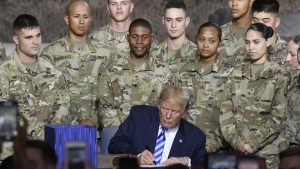President Trump signed the fiscal year 2019 National Defense Authorization Act (NDAA) into law during a visit to Fort Drum, N.Y.
With Trump’s signature, the bill is becoming law before the start of the fiscal year for the first time in more than 20 years and the earliest time in the year in more than four decades.
The NDAA authorizes about $639 billion for the base budget of the Pentagon and defense programs of the Energy Department. It also allows for another $69 billion for a war fund known as the Overseas Contingency Operations (OCO) account.
In signing the bill, which accomplishes many of the administration’s military buildup goals, Trump took credit for the massive budget boost.
“The National Defense Authorization Act is the most significant investment in our military and our warfighters in modern history, and I am very proud to be a big, big part of it,” Trump said in his speech.
“It was not very hard. You know, I went to Congress, I said let’s do it, we got to do it. We’re going to strengthen our military like never, ever before, and that’s what we did,” he said.
What’s next: With the NDAA signed into law, Congress now turns its attention to passing a defense spending bill to make the dollar amounts authorized by the NDAA a reality. The House passed a Pentagon spending bill in June, while the Senate is expected to start considering its version as soon as this week.
Even as they were celebrating Trump’s signature on the bill, leaders of the Armed Services committees were stressing the need for a matching appropriations bill.
“It is now essential that we follow this bill with matching appropriations before the beginning of the fiscal year,” House Armed Services Committee Chairman Mac Thornberry (R-Texas) said in a statement.
“This is the earliest that the NDAA will have been signed into law in more than 40 years, but that historical significance will be lost if we fail to pass appropriations to match the authorization enacted today,” senior Senate Armed Services Committee member Sen. Jim Inhofe (R-Okla.) said in his own statement. “Our military deserves consistent, stable funding and I will continue to work with my colleagues in Congress to ensure that we pass a defense appropriations bill before the end of the fiscal year.”


